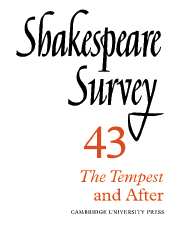Book contents
- Frontmatter
- The Power of Magic: From Endimion to The Tempest
- Reading The Tempest
- The Latter End of Prospero’s Commonwealth
- Henry VIII and the Deconstruction of History
- The Politics of Conscience in All is True (or Henry VIII)
- Shakespeare’s Romantic Innocents and the Misappropriation of the Romance Past: The Case of The Two Noble Kinsmen
- The Hand of John Fletcher in Double Falsehood
- ‘The Duke my Father’s Wrack’: The Innocence of the Restoration Tempest
- ‘Remember/First to Possess his Books’: The Appropriation of The Tempest 1700-1800
- The Tempest and After
- Poetry’s Sea-Changes: T. S. Eliot and The Tempest
- The New Function of Language in Shakespeare’s Pericles: Oath versus ‘Holy Word’
- The Discovery of The Rose Theatre: Some Implications
- The Origins of the Roxana and Messallina Illustrations
- Recycling the Early Histories: ‘The Wars of the Roses’ and ‘The Plantagenets’
- Shakespeare Production in England in 1989
- Professional Shakespeare Productions in the British Isles, January-December 1988
- The Year's Contributions to Shakespeare Studies: 1 Critical Studies
- 2 Shakespeare’s Life, Times, and Stage
- 3 Editions and Textual Studies
- Books Received
- Index
Recycling the Early Histories: ‘The Wars of the Roses’ and ‘The Plantagenets’
Published online by Cambridge University Press: 28 March 2007
- Frontmatter
- The Power of Magic: From Endimion to The Tempest
- Reading The Tempest
- The Latter End of Prospero’s Commonwealth
- Henry VIII and the Deconstruction of History
- The Politics of Conscience in All is True (or Henry VIII)
- Shakespeare’s Romantic Innocents and the Misappropriation of the Romance Past: The Case of The Two Noble Kinsmen
- The Hand of John Fletcher in Double Falsehood
- ‘The Duke my Father’s Wrack’: The Innocence of the Restoration Tempest
- ‘Remember/First to Possess his Books’: The Appropriation of The Tempest 1700-1800
- The Tempest and After
- Poetry’s Sea-Changes: T. S. Eliot and The Tempest
- The New Function of Language in Shakespeare’s Pericles: Oath versus ‘Holy Word’
- The Discovery of The Rose Theatre: Some Implications
- The Origins of the Roxana and Messallina Illustrations
- Recycling the Early Histories: ‘The Wars of the Roses’ and ‘The Plantagenets’
- Shakespeare Production in England in 1989
- Professional Shakespeare Productions in the British Isles, January-December 1988
- The Year's Contributions to Shakespeare Studies: 1 Critical Studies
- 2 Shakespeare’s Life, Times, and Stage
- 3 Editions and Textual Studies
- Books Received
- Index
Summary
John Barton and Peter Hall reduced the three parts of Henry VI to two (Stratford, 1963), not only because of their length but also because they believed them to be, as Hall put it, ‘a mess of angry and undifferentiated barons, thrashing about in a mass of diffuse narrative’. When Terry Hands produced the most recent British stage version of the three plays in an unadapted form (Stratford, 1977) he converted some spectators but left others longing for the clarity and consistency of the Barton-Hall version. The key to the problem may lie in a remark made by Helen Mirren, the Queen Margaret of the production: ‘One isn’t playing in three plays, one is playing in a single long play – like a TV serial, or a serialized novel by Dickens.’ The success of Jane Howell’s BBC production of 1982 resulted partly from the fact that Howell, like Mirren, recognized the affinity of the tetralogy to a TV series: at one point she compared it to Dallas. Audiences of a serial which has several writers easily come to terms with the characteristics of the genre: cameo appearances of minor figures, inconsistencies of plot and characterization, even the writing in and out of characters to take account of casting changes. Moreover, the video recorder allows audiences to arrange viewing times to suit themselves, thus solving the purely practical difficulty of fitting in so many theatre visits in the right order. Television may well turn out to be the best home for the Henry VI plays.
- Type
- Chapter
- Information
- Shakespeare Survey , pp. 171 - 182Publisher: Cambridge University PressPrint publication year: 1991



